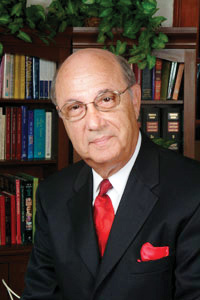
Rabbi Irwin Wiener, D.D.
Rabbi Irwin Wiener, D.D.
There have been many natural disasters in the world. In our lifetime we have witnessed earthquakes, tsunamis, floods, fires—on and on—the list is endless. And we have heard priests and ministers and rabbis explain these catastrophes as some punishment from God for all the evil that has occurred. Human beings, then as now, are compelled to make sense of the universe. We look for patterns, we search for meaning, and we dread the very idea of randomness. We find it difficult to understand how a God who created the universe with such a grand design, a Supreme Being who cares about each one of us, a God who makes the world intelligible, would also create such havoc and destruction.
We question the very idea of religious faith. Voltaire laughed at the idea that we live in the best of all possible worlds, in which everything that happens is a reflection of God’s beneficent will. Others ridiculed the idea that natural disasters were divine retributions; instead, these enlightened people suggested that we investigate the natural causes of these occurrences and then take steps to counter them through inventions and creativity.
I am saddened by the loss of faith and, with it, all sense of hope for the future. And here in the 21st century, recent writings pronounce that they consider holding science’s so-called victory over religion as a cause for celebration. We have heard them all: Religion preaches lies. Religion is stupid and stands in the way of human progress.
And while I am fascinated by science, I also have a deep sense of religious identity. I have a great feeling of respect for intellect. And I need to know what to honestly believe. This is the ultimate question for me, as I am sure it is for you as well, maybe not right this moment, but certainly over the course of time.
We read prayers, but do we really understand what they say? Can we truly believe in the religious values expressed?
So much can be said that makes religion seem irrelevant. Wars have been fought because of religion. People have been persecuted because of religion. We have, in the name of religion, displayed bigotry and exclusiveness. Does religion do more harm than good?
Well, truth be told, I see no evidence that religion is the cause of all evil in the world. We have seen evil through the eyes and actions of so-called humanistic societies such as Nazism, Fascism, totalitarian regimes such as communist Russia, China, and North Korea. So, I would venture a thought that if no religion existed, people would find ways to hurt and maim and kill, regardless, as they have done since time immemorial.
Prayers are designed to help us live the experience of life with all its struggles and joys. They affirm the sanctity of life, teaching that preserving and protecting life is our sacred obligation. For example: Our forebears found the universe amazing, wondrous, stunning, and elegant in its order. There is the natural rhythm of time and the seasons, the passage of heavenly bodies in their orbits. So, what they attempted to do by introducing prayer was to try to bring that orderliness and comforting rhythm into their own lives and into ours through the marvel of prayer, the customs and celebrations that mark the passage of life.
Our ancestors responded to this call with gratitude, and they were fully aware of the price they paid every day for continuing to believe. They regarded with love their Scriptures, their teachings, with gratitude for its guidance and wisdom, inspired by its continual challenge to be more and better and higher with the passing of time.
We know that religion does not give us absolute certainty, and it does not always give us peace. It gives, more than anything else, a sense of challenge and hope in what people can do, guided and instructed by the highest truths we know.
Try it—prayer, that is. Perhaps you will find that you will like it because of the comfort it brings. This is the essence of faith.
